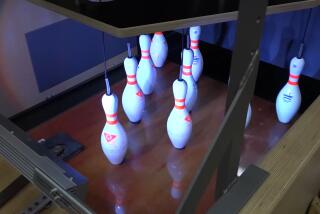The Pachinko Craze: Japanese Eyes Light Up With the Flash of Pinball Machines
TOKYO — Japanese pinball, or pachinko, is a national passion, and devotees cram into crowded, noisy parlors just to watch ball bearings flash, more than one a second, past their eyes.
The game is also big business and makes parlor owners enormous sums of money--by some estimates, the equivalent of 3% of Japan’s total gross national product is spent on pachinko.
Grateful owners reciprocate by awarding selected players the Pachinko Culture Award.
Last year’s winners included the leader of the Japan Socialist Party, Takako Doi. This year’s included Yuji Odashima, Tokyo University’s top Shakespeare expert.
If the bard were alive today, Odashima maintains, he would surely love the game.
“Pachinko is life as well as drama, sometimes tragedy and sometimes comedy. That is what Shakespeare is all about,” he said.
Shakespeare, however, would probably find it tough to make money at the game these days due to the introduction of high-tech machines.
Fended Off Video Games
Pachinko parlors beat back a challenge from video games a few years back by introducing new equipment to dazzle players. But the new machines are harder to beat.
A player buys a box of ball bearings and feeds them into the upright machine (the name pachinko is said to derive from the sound of the ricocheting balls.)
The aim is to direct the stream of balls through a maze of nails into selected slots. The machine disgorges a load of ball bearings into a successful player’s tray which can be exchanged for prizes.
The open secret is that players can choose cash as well, even though the law bans pachinko gambling for money.
Some Make a Living
A select band of professionals even manages to make a living off the game.
“Most people come here because they want to get their money back,” said Katutoshi Kueta, a pro who also runs a pachinko school in Tokyo.
“I think more than 80% of the players are losing money,” he said.
The number of machines in Japan has almost doubled since 1981 to well over 3 million, and the gross income of the 14,000 garish, neon-clad pachinko parlors last year came to around $75 billion--more than four times the 1981 figure.
The new electronic machines have raised the take of the parlors--and increased players’ losses.
Luck Replaces Skill
“With new high-tech machines, luck rather than skill has become a larger factor. Some of the old pros have disappeared,” Kueta said. “But some still make money. One I know is making a million yen ($7,500) a month.”
The former editor of a sports newspaper, Takasi Kondou, said pachinko used to be viewed by players as a game which was fun to play. Now, he said, money is the draw.
“The essence of pachinko has changed from fun to gambling,” he said.
Pachinko first appeared in Japan before World War II, but in the last decade or so the game has become an important source of tax revenue for the government.
“In the past, we didn’t care even if a pachinko parlor went bust,” said a police official who supervises the industry. “But now we think of pachinko as sound entertainment and it should be developed as such.”
Pachinko parlors are notorious tax evaders.
According to the national tax agency, out of 835 pachinko parlors investigated, 414 understated their income for the last financial year by an average of $233,000 each.


